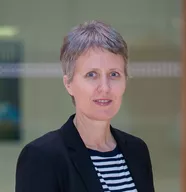Former Employees
Dr. Benedikt Witzenberger

E-Mail: benedict.witzenberger(at)tum.de
Resume
Benedict Witzenberger was a PhD student at the Professorship of Computational Social Science and Big Data at the TUM School of Governance at the Technical University of Munich. He received his Bachelor (Political Science and History) 2014 and his Master (Political Science) 2017 at the Ludwig-Maximilians-University in Munich. The topic of his master thesis was: "Administrative Action and Transparency Policies in Municipalities".
Since 2017 he has been working as a data journalist at the Süddeutsche Zeitung and is doing his doctorate externally on the topic "Advanced statistical methods in data journalism". His research focuses on complex methods and their explanation and visualization when applied in journalistic articles. It is located at the interface between communication science, statistics and computer science.
Dr. Siegfried Müller

E-Mail: siegfried.mueller(at)tum.de
Resume
Siegfried Müller is a PhD student at the Professorship of Computational Social Science and Big Data at the TUM School of Governance at the Technical University of Munich. In his research, he works with data from massively multiplayer online games (MMOGs) and their use in network analysis to study team dynamics and leadership structures. In particular, his current focus is on the investigation of communication networks and their influence on team performance.
Siegfried Müller studied economics at the University of Passau, Ludwigs-Maximilians-University and the Université du Maine from 1999 to 2005. In addition to his doctorate, Siegfried Müller is active as an entrepreneur and coach. Among other things, he was co-founder of the gaming company Travian Games GmbH in Munich and is currently a member of the advisory board of the telematics service provider Invers GmbH in Siegen/Cologne.
Dr. Wienke Strathern

E-Mail: wienke.strathern(at)tum.de
Resume
Wienke Strathern was a PhD Candidate in Computational Social Science & Big Data at TUM School of Governance / Technical University of Munich. She was working as a Research Associate in the project Online Firestorms and Resentment Propagation on Social Media: Dynamics, Predictability, and Mitigation and Online-Offline Spillovers - Potentail real-world implications of online manipulation.
Most recently, as a Research Associate at University of Bremen she managed a tool development for anonymizing qualitative interview data with Jürgen Pfeffer. At University of Munich (LMU) she worked as a Research Associate with Bernhard Huss in an interdisciplinary project on pluralization and authority in the Italian early modern period. She has several years of professional experience as a Project Manager and Editor in a publishing house.
Wienke studied Italian, French and German Linguistics and Literature and Legal Studies at University of Munich (LMU), at University of Heidelberg and at University of Rome.
In her research she studied human behaviour in social media with a focus on language. She uses computer-assisted techniques and methods from quantitative linguistics and qualitative content analysis, experiments and social network analysis. Currently, she is looking at
– how people form moral outrages
– how people hate online
– how these processes can be interrupted.
Selected Publications
Strathern, Wienke; Schönfeld, Mirco; Ghawi, Raji; Pfeffer, Jürgen: Against the Others! Detecting Moral Outrage in Social Media Networks. IEEE/ACM International Conference on Advances in Social Networks Analysis and Mining (ASONAM), 2020.
Strathern, Wienke; Issig, Moritz; Pfeffer, Jürgen: QualAnon - a Tool for anonymizing interview data, 2020.
Homepage
Dr. Cindarella Petz

E-Mail: cindarella.petz(at)hfp.tum.de
Resume
Cindarella Petz is a PhD student at the Professorship of Computational Social Science and Big Data at the TUM School of Governance. She is currently working as a research associate in the field of Digital Humanities.
She studied History and Art History at the Ludwig Maximilian University of Munich, the University of Edinburgh and at the Tel Aviv University in Israel. There, she worked as a student assistant in various research projects in the fields of History of Science and Holocaust Studies.
Cindarella’s doctorate research focuses on Computational History at the interface of Historical Studies and Computer Science. She is particularly interested in how to fruitfully integrate interdisciplinary Computational Methods in the Humanities. Currently, she is working on the application of Historical Network Research on the History of Political Extremism, as well as on Intellectual History.
Selected publications
2019: Raji Ghawi, Cindarella Petz and Jürgen Pfeffer, "'On the Shoulders of Giants', Analysis of a Social Network of Intellectual Influence", The Sixth International Conference on Social Networks Analysis, Management and Security (SNAMS - 2019), Granada, Spain, October 2019. (recommended for best paper award)
2018: Petz, Cindarella: Between Tartan and Tallit? On Zionism in Scotland. In: Collins, Kenneth E.; Newman, Aubrey; Wasserstein, Bernard (Ed.): Two Hundred Years of Scottish Jewry. Scottish Jewish Archives Committee, 239–262.
Dr. Mirko Schönfeld

E-Mail: mirco.schoenfeld(at)hfp.tum.de
Resume
Mirco Schönfeld has been employed as a post-doctoral researcher at the Professorship of Computational Social Sciences and Big Data at the HfP/TU Munich since April 2017. Prior to this position, he was a research associate at the LMU Munich. He completed his Ph.D. in 2016 at the LMU’s Institute of Informatics on the topic "Context and Authenticity in Social Networks." Mirco’s research interests are focused on, but not limited to, context-awareness, data mining and data science, social networks and network analysis. He aims to understand and predict the influence of a network on the behavior of single agents by analyzing the structural and contextual conditions of agents' embeddedness in diverse network.
Selected publications
2016: Mirco Schönfeld. Kontextbezug und Authentizität in Sozialen Netzen, Berlin: Logos Verlag.
2015: Mirco Schönfeld, Martin Werner, Claudia Linnhoff-Popien, and Alexander Erk. "Towards a Privacy-Preserving Hybrid Radio Network: Design and Open Challenges." Proceedings of the 15th International Conference on Innovations for Community Services (I4CS).
2015: Mirco Schönfeld. "HbbRadio oder der personalisierte Rundfunk." Marktplätze im Umbruch. Berlin Heidelberg: Springer.
2015: Martin Werner and Mirco Schönfeld. "The Gaussian Bloom Filter." Proceedings of the 20th International Conference on Database Systems for Advanced Applications (DASFAA).
2015: Martin Werner, Florian Dorfmeister and Mirco Schönfeld. "AMBIENCE: A Context-Centric Online Social Network." 12th Workshop on Positioning, Navigation and Communications (WPNC).
Homepage
http://www.mircoschoenfeld.de/
Dr. Katja Mayer

E-Mail: katja.mayer(at)hfp.tum.de
Resume
Katja Mayer is a sociologist and works at the interface of science, technology and society. Her research focuses on the interaction between social science methods and their public spheres. As part of her postdoc position at the Professorship of Computational Social Science and Big Data, she researches and teaches in the field of "Critical Data Studies". The focus is on the cultural, ethical and socio-technical challenges at the interface of computer science, social sciences and society. Data is treated less as a new raw material, but as a highly variable and fragile phenomenon. In the context of data-driven decision-making, data are not considered as "given", but the way we collect, transform, analyze, and trust data is up for discussion.
In addition, Katja also works as Senior Scientist at the Center for Social Innovation in Vienna and is an Associate Researcher at the University of Vienna's platform "Responsible Research and Innovation in Scientific Practice". For many years she has been teaching Sociology, STS and Web Sciences at the University of Vienna, the Danube University Krems, the University of Art and Design Linz and the University of Lucerne. She was a visiting fellow at the School of Computer Science at Carnegie Mellon University (USA). She is a member of the core team of the Open Access Network Austria (OANA) and co-heads the working group "National Strategy for the Transition to Open Science". In the years 2011-2013 she was a research fellow of the President of the European Research Council (ERC).
Selected publications
2018: Mayer, Katja, Sabina Leonelli, Kim Holmberg, and Frank Miedema. Mutual Learning Exercise: Open Science — Altmetrics and Rewards. European Commission.
2018: Mayer, Katja, Barbara Kieslinger, and Teresa Schäfer. "Open and Participatory Citizen Social Science for Evidence-Based Decision Making." In: Proceedings of the Austrian Citizen Science Conference. Frontiers.
2017: Lupu, Mihai, Katja Mayer, Noriko Kando, and Anthony Trippe. Current Challenges in Patent Information Retrieval. Springer.
2016: Mayer, Katja. Netzwerkvisualisierungen. Anmerkungen zur visuellen Kultur der Historischen Netzwerkforschung. In Handbuch Historische Netzwerkforschung. LIT Verlag: 211.
2016: Mayer, Katja and Eduard Aibar. "Open Science in Practice - STS Approaches to Open Cultures in Research." EASST Review, 35(4).
2016: Mayer, Katja and Lisa Sigl. Responsible Research and Innovation in Academic Practice. OEAD News, 101 (Oct. 2016), 10–13.
2015: Morstatter, Fred, Jürgen Pfeffer, Katja Mayer, and Huan Liu. "Text, Topics, and Turkers: A Consensus Measure for Statistical Topics." In Proceedings of the 26th ACM Conference on Hypertext & Social Media. ACM: 123–131.
Homepage
Dr. Ashwini Rao

E-Mail: ashwini.rao(at)hfp.tum.de
Resume
Ashwini Rao recently completed her doctorate in computer science.
She is interested in interdisciplinary research and its challenges in the area of privacy and security on the Internet.
Homepage
https://scholar.google.com/citations?user=JsHgFUwAAAAJ&hl=en&oi=ao
Dr. Nikou Günnemann

Funding
PhD scholarship from the BMW Group
Resume
Nikou Günnemann graduated in 2018 with a PhD in computer science from the TU-Munich. Her research interests include the analysis of dynamic data and machine learning to identify and describe patterns, trends, and relationships in data.
Selected publications
2017: Gunnemann, Nikou and Jürgen Pfeffer. "Predicting Defective Engines using Convolutional Neural Networks on Temporal Vibration Signals." In: First International Workshop on Learning with Imbalanced Domains: Theory and Applications, 92-102.
2017: Gunnemann, Nikou and Jürgen Pfeffer. "Cost Matters: A New Example-Dependent CostSensitive Logistic Regression Model." In: Pacific-Asia Conference on Knowledge Discovery and Data Mining. Springer, 210-222.
2015: Gunnemann, Nikou and Jürgen Pfeffer. "Finding Non-Redundant Multi-Word Events on Twitter." In: Advances in Social Networks Analysis and Mining (ASONAM). 2015 IEEE/ACM International Conference on IEEE, 520-525.
2014: Gunnemann, Nikou, Stephan Gunnemann and Christos Faloutsos "Robust Multivariate Autoregression for Anomaly Detection in Dynamic Product Ratings." In: Proceedings of the 23rd International Conference on World Wide Web ACM, 361-372.
2014. Gunnemann, Nikou, Stephan Gunnemann and Christos Faloutsos. "Detecting Anomalies in Dynamic Rating Data: A Robust Probabilistic Model for Rating Evolution." In: Proceedings of the 20th ACM SIGKDD International Conference on Knowledge Discovery and Data Mining ACM, 841-850.
Dr. Elena Fernandez-Fernandez

Resume
Elena Fernandez is a Eurotech Post-Doctoral Fellowship awardee at the Professorship of Computational Social Science and Big Data at the TUM School of Governance of the Technical University of Munich.
Her Post-Doctoral Research Project, Time, Technology and the Press. A Study of Accelerations of Time Perceptions during the Industrial and Digital Revolutions, aims to quantify the acceleration of the social construction of time by inspecting fluctuations in information density over time using Computational Research Methods. Taking as a time frame two clusters of time that coincide with the second and latest Industrial Revolutions, her research project will investigate information behavior historically as documented in the press of four different countries.
Her research profile incorporates Intellectual History, Cultural Studies, History of Ideas, and Technology in Society. She is as well particularly interested in Natural Language Processing and Computational Linguistics as a field of study in itself, as well as a methodology to be applied to Social Sciences and Humanities research.
Elena holds a PhD in Hispanic Languages and Literatures (University of California, Berkeley, 2019), a M.A. in Spanish Studies (University of Virginia, 2013), and a B.A. in English Philology (University of Salamanca, 2011). Her first book, Raza y nación. Procesos de construcción de identidades nacionales en España (1750-1833), will be published in 2020 by Peter Lang Publishing.
Publications:
- Fernandez Fernandez, Elena. “From Subject to Citizen? A Debate about Citizenship and Race in the Works of José Blanco White and Fray Servando Teresa de Mier.” International Review of Eighteenth Century Studies, 4, 2018. Pp. 129-140.
- Fernandez Fernandez, Elena. “A Racial Interpretation of the Numancia National Myth in the works of Miguel de Cervantes and Ignacio López de Ayala”. Dieciocho, 41:2, 2018. Pp. 81-300.